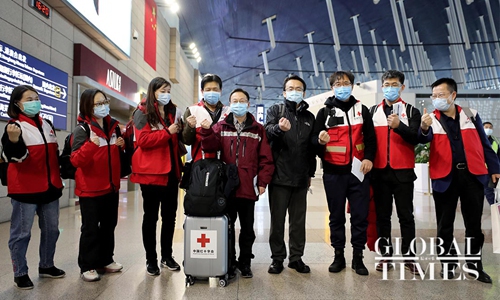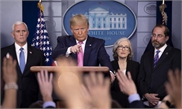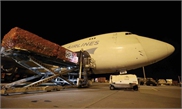
China dispatches a team of nine medical experts to Italy, on Thursday, to help fight the COVID-19 pandemic, along with 31 tons of medical supplies, including ICU ward equipment, protectiveoutfits, and antiviral drugs. Photo: Yang Hui/GT
As the number of new infected cases of the novel coronavirus slows in China, Europe and the US are becoming the epicenter of the global outbreak. It is time for China to introduce its experiences.
China has donated masks and diagnostic swabs to Italy, the European country hit hardest by the coronavirus, earning gratitude from the Italian public. China has also sent medical teams to assist Iran and Italy, and established a joint prevention and control mechanism with South Korea. China stands ready to strengthen coordination and cooperation with the EU against the virus.
China's efforts and endeavor to contain the spread of the virus on its soil and beyond its border have been seen by the world. Regardless of the initial somewhat delayed response to the outbreak, China has mobilized all the resources needed to combat this battle. Picky Westerners who do not fixate on China's political system, which is quite different from theirs, should acknowledge the value and relevance of China's measures to them.
China does not impose its measures on any other country. Different countries have different situations, and it may be unrealistic to expect other countries to fully copy China's model. Many of the measures taken by China are related to its political system, and have proven effective. The measures, such as a lockdown of the hardest-hit areas, quarantine of those from hard-hit regions and offering free medical care to anyone infected, are motivated by a serious concern for the public good and universal values. Under what political system they are implemented should not be a concern.
China's experiences came at a heavy price and it is fortunate that China could quickly steer in the right direction. However, some Western politicians, who either hold a stubbornly superior mind-set toward their own system or lack political will, still refuse to look to the useful part of China's experiences. The absence of a self-correction function will only make the Western mechanism fall behind.
The World Health Organization (WHO) has spoken highly of China's experiences. As a world health watchdog, the WHO has the obligation to supervise countries and inform them what useful lessons they can draw from China, such as how China ensured that critically ill patients could get proper treatment and in the latter stage how there was no infected case among China's medical staff.
Meanwhile, the Chinese media and relevant authorities should also think of appropriate ways to introduce China's experiences. MSNBC interviewed Donald McNeil, science and health reporter for the New York Times, who shed light on how China effectively and efficiently handles a person who may have contracted the novel coronavirus. On YouTube, the comments were quite positive about what China has done and said what McNeil revealed was "incredibly informative" and "an apolitical insightful facts-based analysis."
Now the world should let facts speak and China should think of how to make it happen for the good of the entire world.




